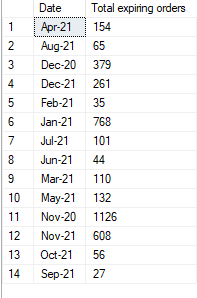Check this variation:
declare @table as table ([Date] date, [expiring orders] int)
insert @table values
( '11/1/2020 ', 234 ),
( '11/21/2020 ', 765 ),
( '11/30/2020 ', 127 ),
( '12/1/2020 ', 145 ),
( '12/18/2020 ', 234 ),
( '1/5/2021 ', 456 ),
( '1/15/2021 ', 312 ),
( '2/2/2021 ', 12 ),
( '2/12/2021 ', 23 ),
( '3/2/2021 ', 13 ),
( '3/12/2021 ', 43 ),
( '3/30/2021 ', 54 ),
( '4/9/2021 ', 67 ),
( '4/27/2021 ', 87 ),
( '5/7/2021 ', 98 ),
( '5/25/2021 ', 34 ),
( '6/4/2021 ', 23 ),
( '6/22/2021 ', 21 ),
( '7/2/2021 ', 21 ),
( '7/20/2021 ', 34 ),
( '7/15/2021 ', 23 ),
( '8/2/2021 ', 43 ),
( '7/28/2021 ', 23 ),
( '8/15/2021 ', 5 ),
( '8/10/2021 ', 4 ),
( '8/28/2021 ', 6 ),
( '8/23/2021 ', 7 ),
( '9/10/2021 ', 8 ),
( '9/5/2021 ', 9 ),
( '9/23/2021 ', 6 ),
( '9/18/2021 ', 4 ),
( '10/6/2021 ', 3 ),
( '10/1/2021 ', 2 ),
( '10/19/2021 ', 4 ),
( '10/14/2021 ', 4 ),
( '11/1/2021 ', 324 ),
( '10/27/2021 ', 43 ),
( '11/14/2021 ', 23 ),
( '11/9/2021 ', 4 ),
( '11/27/2021 ', 234 ),
( '11/22/2021 ', 23 ),
( '12/10/2021 ', 4 ),
( '12/5/2021 ', 234 ),
( '12/23/2021 ', 23 )
select * from @table
---
select concat(SUBSTRING('JanFebMarAprMayJunJulAugSepOctNovDec', MONTH([Date]) * 3 - 2, 3), '-', YEAR([Date]) % 100) as [Date],
SUM([expiring orders]) as [Total expiring orders]
from @table
group by YEAR([Date]), MONTH([Date])
order by YEAR([Date]), MONTH([Date])
or:
select FORMAT(MIN([Date]), 'MMM''-''yy') as [Date],
SUM([expiring orders]) as [Total expiring orders]
from @table
group by YEAR([Date]), MONTH([Date])
order by YEAR([Date]), MONTH([Date])

